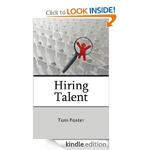From the Ask Tom mailbag –
Question:
Yesterday, you talked about looking for evidence of potential. I followed the explanation, but I am still looking for some sort of instrument to help measure a candidate’s capability or more importantly, a candidate’s potential for higher capability. I get that I can measure the level of work in a candidate’s current or former role and match (or not match) that to the level of work in our open role. I can assume that if a person was effective in that level of work somewhere else, they are likely to be effective in that level of work with us. But I still want to know if they might have the potential for higher levels of work now, or sometime in the future.
Response:
There is a temptation in this discussion for managers to visit a place called Hope Island. Hope Island is a wonderful resort destination with luxury accommodations at the Assumption Hotel. The five-star Assumption Hotel has a water theme park sporting a replica of Egypt’s Denial River and a water flume ride where participants ride down the steep Pitch of Performance into a pool of reflective water.
As long as we are not going to Hope Island, we can continue this discussion.
Kevin Earnest replied to yesterday’s post to discuss some specific tools that may be useful to the manager and the manager-once-removed. “As we know from Human Capability, when an employee, manager and MoR “calibrate” to a person’s CPC (current potential capability), they are placing a dot on the Talent Pool Maturation Data Sheet and making a hypothesis about the person’s potential development. If you follow the trajectory on the Data Sheet, we can foresee their anticipated long term potential development. CEOs and managers must continue testing the hypothesis with additional tasks or special projects (real talent pool development) to determine if, in fact, the person is maturing as anticipated.”
So, there is an instrument, a chart that can be useful to the manager and manager-once-removed. This chart is documented most thoroughly in a book first published in 1994 called Human Capability, by Elliott Jaques and Kathryn Cason. This chart is a visual representation of how a person’s natural capability matures through time. It shows different trajectories as each person, in their own life, is on their own path.
But here is the critical part of Kevin’s response. While the chart may be helpful, it must be tested continually with projects and tasks. Stay off of Hope Island. The only measure of performance is performance. Lee Thayer said that.


